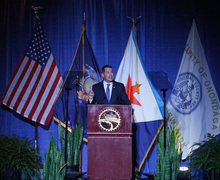Integrity policy change leads to more referrals
Changes to Syracuse University’s Academic Integrity Policy led to an increased number of referrals for academic violations by university faculty last semester.
‘The new process is flowing smoothly, with increased volume across the board,’ said Gary Pavela, director of the Academic Integrity Office, in an email.
The biggest change to the policy involves distinguishing between academic dishonesty and academic negligence. Academic dishonesty is characterized by an intent to deceive and can result in disciplinary sanctions. Academic negligence is unintentional and cannot go on a student’s record but may still result in course failure.
The new policy also makes the XF grade penalty the standard punishment for academic dishonesty. An XF grade is a failing grade that is counted in a GPA. The grade accompanies a note on a student’s transcript, explicitly saying he or she violated the Academic Integrity Policy, according to the Academic Integrity Office’s website.
Seventy-seven referrals were filed last fall, up from 68 referrals during fall 2010, an increase of 13 percent, Pavela said. A warning for academic negligence was the most common action taken and occurred in 23 of the referrals. The second most common action was the new XF grade and transcription penalty notation, which occurred in 17 of the referrals, Pavela said.
After receiving an XF grade punishment, it is a requirement for students to complete an academic integrity seminar. Last fall, 13 students completed the seminar, a 38 percent increase from fall 2010 with eight students, Pavela said.
Eric Holzwarth, deputy director of the Renée Crowne University Honors Program and a member of the University Senate Committee on Instruction that proposed the changes, said he thinks the new policy is a significant improvement over the old one, especially the distinction between academic dishonesty and academic negligence.
‘It’s a positive step to make that change to protect students who just made a mistake and cited a source wrong,’ he said.
Jenna Mayotte, the business librarian at E.S. Bird library and a member of the committee, agreed with Holzwarth.
‘The new policy puts us more in line with other schools and their policies,’ she said. ‘The policy needed to be updated to reflect necessary changes.’
The Academic Integrity Office is also working on a major initiative that will allow them to work more closely with the Student Association. The initiative will allow SA volunteers to become hearing board members, hearing officers and presenters, Pavela said.
Pavela will also deliver an annual report to SA on university academic integrity standards and enforcements as part of the new initiative.
‘The aim is a much richer partnership between student leaders and the AIO,’ Pavela said.
Jesse Feitel, SA’s Academic Affairs Committee chair and a junior political science major, led an effort last semester to have SA representation in the form of an Academic Integrity Board, with the support of Bonnie Kong, the former Academic Affairs Committee chair.
‘The board will act as a way for students to convey their ideas, experiences and innovations to the AI Office, and to provide a unique set of ears and set of experiences to the board and to hearings,’ Feitel said in an email.
Last semester, Feitel and two other students, also from SA, were chosen to be on the board and are currently in the process of training. Feitel said he expects the board to eventually be open to the rest of the student population as well.
Feitel, who also sits on the University Judicial Board, said there are similarities between the boards.
‘I think there are a lot of parallels between the two — students are able to listen to their peers and discuss common experiences and offer practical and constructive solutions to difficult issues at hand,’ he said.
Feitel said he is excited about the new initiative and believes student involvement on the boards will only improve them.
‘The Academic Integrity Office already does a tremendously positive and great job on this campus,’ he said, ‘and having student input will only make the process that much better.’
Published on January 25, 2012 at 12:00 pm
Contact Jessica: jliannet@syr.edu | @JessicaIannetta





